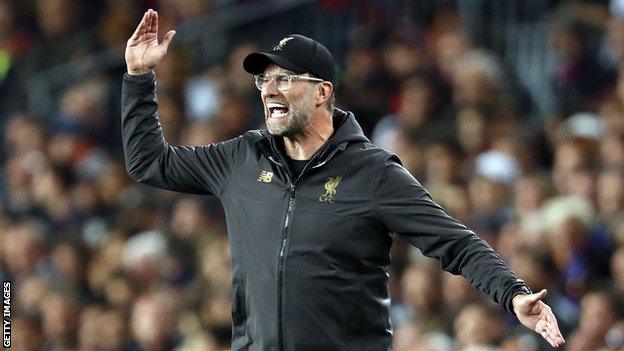Jurgen Klopp restores Liverpool’s fire to offer hope amid title pain
- Published

Klopp was named Liverpool boss in 2015 and has led them to two Champions League finals
Martin Quast, a friend of Jurgen Klopp's since the early 1990s, has witnessed the manager's worst defeats and biggest triumphs from close quarters.
But when the football journalist went to meet with the Liverpool boss at his Anfield office after the 4-0 miracle against Barcelona, he found Klopp happier than he had ever seen him before.
"There was this deep contentment etched on his face, you could feel his pride and his sense of achievement," Quast told the BBC.
"I've never seen him this satisfied. Not even after winning the double with Borussia Dortmund in 2012."
Last Tuesday's spectacular comeback against the Catalan side didn't win Klopp any trophies.
But a wild night that had seen his sensational football team and the frenzied Kop combine forces to conjure up the mythical powers of Anfield marked the completion of the most fundamental part of his work on Merseyside.
Three-and-a-half years since he had vowed to turn "doubters into believers", Liverpool are once again a club whose "pounding heart" (Klopp) can cause a footballing earthquake.
It is that wider achievement that, despite the pain of missing out on the Premier League title to Manchester City, makes this season a huge success for the Liverpool manager, no matter what happens when they meet Tottenham in the Champions League final in Madrid on 1 June.
Whereas Carlo Ancelotti, another contender for the job in October 2015, had presented owners Fenway Sports Group with a shopping list of three star players in defence, midfield and attack that he felt were needed to lift the tired Reds out of mid-table mediocrity, Klopp told the Americans in a meeting in New York that the main thing was to "activate the crowd".
Both at Mainz and at Dortmund, Klopp had learned that a strong bond between fans and players - a unified purpose - could push a team to the very limit of its capabilities and sometimes beyond. Tactics and systems were important, of course, but Liverpool could only become a force in England and Europe again if they could harness the special energy they used to generate.
Klopp is convinced that success comes from within. Liverpool had to reconnect with their identity as winners before they could become winners once more.
"He talked a lot about the team trusting itself, about belief, and not fearing any other team," Adam Lallana said of Klopp's first few days at Melwood, which resembled a lengthy therapy session.
"He definitely had that confidence himself, that aura and belief that he is a top manager. He walked through the door and you could feel it. And I think that automatically filters through."
"A coach must love his players," the 51-year-old once told a staff member at Dortmund. Klopp, like many who excel at their job, really does love coaching too.
As a child, he wanted to be a doctor - "I wanted to help people" - and he sees his task as looking after the heart, body and soul of his charges to enable them to perform to their best abilities.
To do so, he finds out about their hopes and fears in lengthy talks, and adopts a specific psychological approach for every single player. A close look at his post-match demeanour over the years showed that his famously tactile appreciation of his players came in a number of varying degrees.
A long hug symbolised great praise. Lesser performances were greeted with a friendly tap on the shoulder, while a young player in danger of getting carried away could find himself gently slapped in the face. Klopp's physical closeness defines and strengthens the social structures within the dressing room and enhances the bond between him and his men.
This way of coaching is also informed by Klopp's religious convictions and personal experiences. Raised as a Protestant by his mother Elisabeth - his football-obsessed father Norbert was a Catholic - Klopp sees it as his duty to make those around him "feel valued" and "to leave the place you work in a little more beautiful".
As a moderately talented second-division player at Mainz, he found himself mostly subjected to coaches who hid their own failing by coming across as overly authoritative; instead of explaining ways to play better, they would shout a lot and blame the teams for defeats.
Klopp, by contrast, has often told his players that he would take responsibility if it didn't work out on the pitch.
"My guiding principle is to wonder how I would like to be treated in order for me to enjoy my work and to be able to perform," he said in an interview with Impuls magazine in 2010. "Fifteen years ago, football was very different. Managers would bark orders, and no one was allowed to pose any questions."
Perhaps most importantly, Klopp and his staff have not been above questioning themselves since their arrival on Merseyside. Little by little, they adjusted their high-tempo pressing tactics and their training regime to the demands of the Premier League. "Football is a process of learning," his assistant Peter Krawietz has said.
Liverpool have been more controlled throughout the season, and so has Klopp. He no longer needs to jump up and down on the touchline or throw invisible hand grenades onto the pitch to get the whole of Liverpool going.
The fire is already burning bright - and it will continue into next season, despite the immediate agony that goes with finishing as the best runners-up in Premier League history.